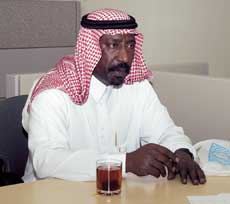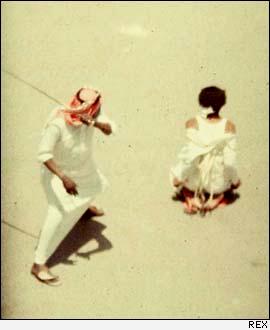I had a friend looking for work some years ago, and I sent him this as helpful. I just got it back. I don't know what kind of person he thinks I am. But, if things continue as they are today perhaps if I pick up my French a bit or even go so far as too learn Swedish I might just have a new career after all.
****
Kingdom's Leading Executioner Says: 'I Lead a Normal Life'
Mahmoud Ahmad, Arab News Staff
Muhammad Saad Al-Beshi says he is calm at work because he is doing God's work. (Photo by Muhammad Al-Shehry)
JEDDAH, 5 June 2003 — Saudi Arabia's leading executioner Muhammad Saad Al-Beshi will behead up to seven people in a day.
"It doesn't matter to me: Two, four, 10 — As long as I'm doing God's will, it doesn't matter how many people I execute," he told Okaz newspaper in an interview.
He started at a prison in Taif, where his job was to handcuff and blindfold the prisoners before their execution. "Because of this background, I developed a desire to be an executioner," he says.
He applied for the job and was accepted.
His first job came in 1998 in Jeddah. "The criminal was tied and blindfolded. With one stroke of the sword I severed his head. It rolled meters away." Of course he was nervous, then, he says, as many people were watching, but now stage fright is a thing of the past.
 He says he is calm at work because he is doing God's work. "But there are many people who faint when they witness an execution. I don't know why they come and watch if they don't have the stomach for it.
He says he is calm at work because he is doing God's work. "But there are many people who faint when they witness an execution. I don't know why they come and watch if they don't have the stomach for it."Me? I sleep very well," he adds.
Does he think people are afraid of him? "In this country we have a society that understands God's law," he says. "No one is afraid of me. I have a lot of relatives, and many friends at the mosque, and I live a normal life like everyone else. There are no drawbacks for my social life."
Before an execution, nonetheless, he will go to the victim's family to obtain forgiveness for the criminal. "I always have that hope, until the very last minute, and I pray to God to give the criminal a new lease of life. I always keep that hope alive."
Al-Beshi will not reveal how much he gets paid per execution as this is a confidential agreement with the government. But he insists that the reward is not important. "I am very proud to do God's work," he reiterates.
However, he does reveal that a sword will cost something in the region of SR20,000. "It's a gift from the government. I look after it and sharpen it once in a while, and I make sure to clean it of bloodstains.
"It's very sharp. People are amazed how fast it can separate the head from the body."
By the time the victims reach the execution square they have surrendered themselves to death, he says, though they may hope to be forgiven at the last minute. "Their hearts and minds are taken up with reciting the Shahada." The only conversation with the prisoner is when he tells him to say the Shahada.
"When they get to the execution square, their strength drains away. Then I read the execution order, and at a signal I cut the prisoner's head off."

He has executed numerous women without hesitation, he explains. "Despite the fact that I hate violence against women, when it comes to God's will, I have to carry it out."
There is no great difference between executing men and women, except that the women wear hijab, and nobody is allowed near them except Al-Beshi himself when the time for execution comes.
When executing women he will use either gun or sword. "It depends what they ask me to use. Sometimes they ask me to use a sword and sometimes a gun. But most of the time I use the sword," he adds.
As an experienced executioner, 42-year-old Al-Beshi is entrusted with the task of training the young. "I successfully trained my son Musaed, 22, as an executioner and he was approved and chosen," he says proudly. Training focuses on the way to hold the sword and where to hit, and is mostly through observing the executioner at work.
An executioner's life, of course, is not all killing. Sometimes it can be amputation of hands and legs. "I use a special sharp knife, not a sword," he explains. "When I cut off a hand I cut it from the joint. If it is a leg the authorities specify where it is to be taken off, so I follow that."
Al-Beshi describes himself as a family man. Married before he became an executioner, his wife did not object to his chosen profession. "She only asked me to think carefully before committing myself," he recalls. "But I don't think she's afraid of me," he smiles. "I deal with my family with kindness and love. They aren't afraid when I come back from an execution. Sometimes they help me clean my sword."

A father of seven, he is a proud grandfather already. "I have a married daughter who has a son. He is called Haza, and he's my pride and joy. And then there are my sons. The oldest one is Saad, and of course there is Musaed, who'll be the next executioner," he adds.
http://www.arabnews.com/?page
****
Yup, it's all relative. What's good for them isn't necessarily good for us, but it's not our place to impose our values on others. We don't understand their culture and so on till I want to puke. These people, these Saudis, are our allies, and the creatures who support them are our politicians and our Leftist weepers who cry about racism and islamophobia.
I say: "Off with their heads!"



1 comment:
Excellent article Dag. Once again we see how brutal and inhuman this ideology really is, and why it must be destroyed. Some author whose name escapes me wrote: "The best thing you can do for a Muslim is to separate him from his religion."
Post a Comment